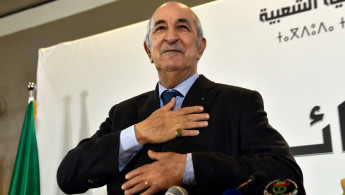Algeria’s new president begins duties on Thursday amid protests over legitimacy
Tebboune, who was prime minister of Algeria from May 2017 to August 2017 has a difficult road ahead of him, as protesters reject his presidency and accuse him of coming from Abdelaziz Bouteflika’s cadre of corrupt officials.
He is to be sworn in as Algeria’s eight president, and his appointment comes following nine months of peaceful nationwide protests in the North African country, first rallying against the sick Bouteflika’s plans to extend his 20-year rule, and then pushing to end the reign of the ruling elite.
Tebboune has said he is committed to open dialogue with the protest movement, claiming there will be “no revenge, nor exclusion and marginalisation” during his term.
During a press conference on Friday talking about his upcoming term, he said he has “a number of priorities to tackle” at the beginning of his term as president, “namely opening dialogue with the different components of the protest movement.”
Tebboune, 74, took 58 per cent of the vote – even though tens of thousands of Algerians boycotted the election, with criticisms that he and the other four candidates had close links with the former political establishment.
“The vote is rigged. Your elections are of no concern to us and your president will not govern us,” demonstrators chanted in central Algiers on Friday.
The results were widely unpopular, and in parts of the country protesters defied a heavy police presence to hold a mass rally in the heart of the capital and smaller demonstrations in provincial cities.
Tebboune, who has been in politics four decades and held several official positions in that time, as well as the other four candidates who had been running for the presidency, are widely shunned by protesters as “children of the regime.”
|
“This will not be the end of the crisis,” Ben Ali, a retired civil servant and protestor told Financial Times.
“This is the start. Is Tebboune even free to make his own decisions? He’s just part of the gang.”
Tebboune is close to powerful army chief General Ahmed Gaid Salah and has expressed his distain for oligarchs and what he describes as the “gang” – seeking instead to distance himself from it.
Comment: Algerians, now's the time to finish what you started
“I think he will fulfil most of the protesters’ demands, including the release of political prisoners, guaranteeing freedom of expression and even freedom of the press,” political analyst Zine Labidine Ghebouli told Al Jazeera.
Tebboune appears to be keen to get the protesters on his side, and in his first public address since the win, he said he wants to “extend a hand” to the protest movement “for a dialogue to build a new Algeria.”
Although the protest movement remains peaceful, with minor scuffles reported between police and protesters in the Amazigh stronghold of Kabylie and the Belouizdad neighbourhood of Algiers, analysts fear that law enforcement will be more violent in quelling the protests now that a president has emerged.
Follow us on Twitter and Instagram to stay connected




 Follow the Middle East's top stories in English at The New Arab on Google News
Follow the Middle East's top stories in English at The New Arab on Google News
![Israeli forces ordered bombed Gaza's Jabalia, ordering residents to leave [Getty]](/sites/default/files/styles/image_330x185/public/2176418030.jpeg?h=a5f2f23a&itok=_YGZaP1z)

